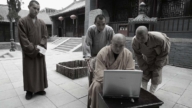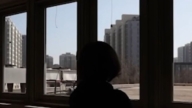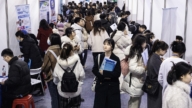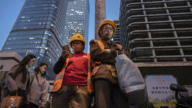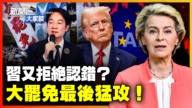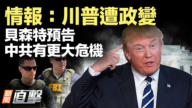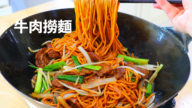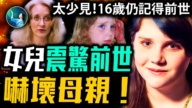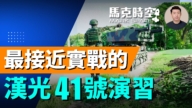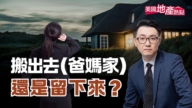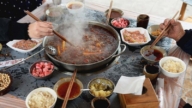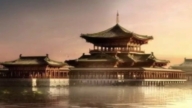【新唐人2011年10月15日讯】中共六中全会召开前夕,中共党报《人民日报》发表题为“文化高地正崛起”的文章,大赞重庆的唱红歌,读红书是唱响了“社会主义的主旋律”。报导再次引起舆论界对当前中国文化界的动向,和重庆市一把手薄熙来仕途的议论。不过学者们表示,这是文革再现,中共穷途末路的表现。
《人民日报》“文化高地正崛起”这篇报导赞扬重庆市“唱响主旋律”,并坚持“社会主义先进文化前进方向”。
时政评论家伍凡认为,《人民日报》给薄熙来加油打气,凸显中共内部权力的角斗。
伍凡:“人民广播电台,中央电视台有没有天天唱主旋律呢,有没有唱红歌呢,好像还没有嘛,就重庆这一块嘛,我想光靠共产党吹捧,江泽民支持,薄熙来命不长啦。”
伍凡认为,中共又搬出文革那一套,说明中共真的要毁灭了。
伍凡:“人家一定会反抗啊,在30多年前,唱红打黑比现在还厉害,全国都唱, 这些东西是违背老百姓的心愿的,如果真的走到这一步,那共产党真的是快走到绝路了,它没东西了,拿不出任何东西了,要拿毛泽东的东西出来了。”
香港《动向》杂志主编张伟国也向《新唐人》表示,所谓的文化改革,是文革的一个翻版,重庆市的唱红歌,读红书是想用原来的方法堵老百姓的嘴,为权贵们的腐化堕落提供环境。
张伟国:“他要回文革又回不去,事实上红歌的东西也很难继续下去,因为他是要靠政府,靠政府的资源,重庆搞唱红歌把电视台的广告拿掉,占用上班的时间,统一服装,这种花费,这种资源的消耗都是贴进去的,中国已经有过一次文革了,他成为主旋律,就意味着中国向着文革,向着毛时代倒退。”
前北大新闻系教授焦国标则在《我为什么不担心毛左复辟》一文中写道:毛时代的五种政治贱民,加上被株连的亲属,直接被毛左祸害的人不下1亿之多。从毛时代走出来的其他几亿人,政治上虽没有遭受大伤害,起码遭受过毛时代的物质匮乏之苦,和视觉、听觉方面的人道、良知伤害。
据张伟国分析,随着改革开放,中国社会多元化的成分越来越大,人们的见识也越来越广,中共统一思想的文化体系已经崩溃,很多想在十八大有所表现的中共领导人,企图再一次恢复原来惯用的一套。
张伟国:“薄熙来是最突出的一个,唱红歌使得中国的文革思潮复辟,到了一个新的高度,毛的左派也公然把它当作一个新的领袖,另一方面,也证明了中国这个社会失去了一个发展方向,在一种十字路口,从上到下都迷茫,除了既得利益集团、特权阶级抓紧一切机会捞一把,其他的他们什么都不管了。 ”
据张伟国观察,薄熙来在国内外媒体大造声势,企图使他的影响盖过当政8年的胡温。不过,伍凡认为,薄熙来的做法只会把人吓跑,有钱、有本事的人会抓紧移民外国。
新唐人记者刘惠、李若琳采访报导。
CCP Mouthpiece ‘People’s Daily’ Cheers For Bo Xilai
On the eve of the Sixth Plenary Session of the
Central Committee of the CCP(Chinese Communist Party),
People’s Daily, CCP’s mouthpiece, published an article
entitled “Highland of Culture is Emerging”, praising the
singing of ‘red songs’ and reading ‘red books’ in Chongqing and that it
demonstrates " the main theme of socialism."
The report once again aroused public discussion
on the moving direction of China’s cultural field and
the career of Bo Xilai, CCP Secretary of Chongqing.
Scholars said that this is the recurrence of
the Cultural Revolution, showing that the CCP has
driven itself into the ground.
A report in People’s Daily, entitled
“Highland of Culture is Emerging”, praises
Chongqing authorities for “singing out the main theme” and
adhering to “socialist advanced culture.”
Wu Fan, a political critic, comments that People’s Daily is
cheering for Bo Xilai, highlighting the power struggle
inside the CCP.
Wu Fan: “Does China National Radio or China Central Television
sing out the main theme every day? or sing the red songs?
The answer seems to be NO, Chongqing is the only one.
I believe that only by relying on CCP’s boasting, and Jiang Zemin’s
support, Bo is approaching the end of his career.”
Wu Fan said that the CCP is once again up to its old tricks
from the Cultural Revolution era. This serves to prove that the CCP
is indeed on the path to ruin.
Wu Fan: “Civilians will definitely resist this. 30 years ago,
the movement of singing the red songs and suppressing
the mafia was more widespread. Everywhere across China
got involved. All of this is against the public’s wishes.
If the CCP has really come this far, it is in reality close to
a dead end. The CCP has nothing to show now, so it
has to fetch out the old tricks of Mao Zedong.”
Zhang Weiguo, Editor-in-chief of Trends magazine
in Hong Kong, told NTD that the so-called cultural reform
is actually a replica of the Cultural Revolution.
The campaign of singing red songs and reading red books
in Chongqing aims to use the old method of blocking the mouths
of the masses, and providing a favorable environment of
corruption for CCP’s dignitaries.
Zhang Weiguo: “It is impossible to go back to theCultural Revolution era. In fact, even the propaganda like
singing red songs is difficult to continue, for such a practice
utilizes resources from the government. The TV ads have to
be removed for the program of singing red songs.
The activities occupy working hours and purchase uniforms.
The consumption of such resources
is out of the pocket of subsidy.
China has had a Cultural Revolution.
Now, letting the Cultural Revolution become the main theme
means that China is moving back to the Cultural Revolution,
to the era of Mao. ”
Jiao Guobiao, former professor of journalism, Peking Univ.
wrote in his article entitled “Why don’t I worry about
the restoration of the Maoist left,
“As many as 100 million Chinese people suffered direct harm
by the Maoist left in the era of Mao. This covers five categories
of political pariahs, plus their implicated relatives.
For the other several hundreds of millions in the Mao era
who did not suffer much in politics, they at least experienced
material deprivation and the hurt of humanity and conscience
in their visual and auditory aspects. ”
Zhang Weiguo analyzed that along with the opening up,
the diversification is growing inside China.
The public’s discernment has kept increasing.
The ideology of the CCP to unify thoughts has collapsed.
Many CCP leaders who want to gain political power in
the 18th CCP congress, attempted to restore the old ways
that they are familiar with.
Zhang Weiguo: “Bo Xilai is the most typical one. Singing
red songs revived the ideology of the Cultural Revolution.
Bo promoted it to new heights, so the Maoist left openly
regards him as a new political leader.
On the other hand, it proves that Chinese society missed
its direction of development and is stopped at a crossroad, entirely confused.
In addition to vested interest groups, the privileged class
seizes every opportunity to reap profits; they leave all others of this society alone.
Zhang Weiguo comments that Bo Xilai made big fanfare
in domestic media and overseas, attempting to overshadow
the Hu-Wen who have been in power for eight years.
However, Wu Fan believes that Bo Xilai’s action will
scare away the people, triggering those rich and capable
people to emigrate even more quickly.
NTD reporter Liu Hui and Li Ruilin


